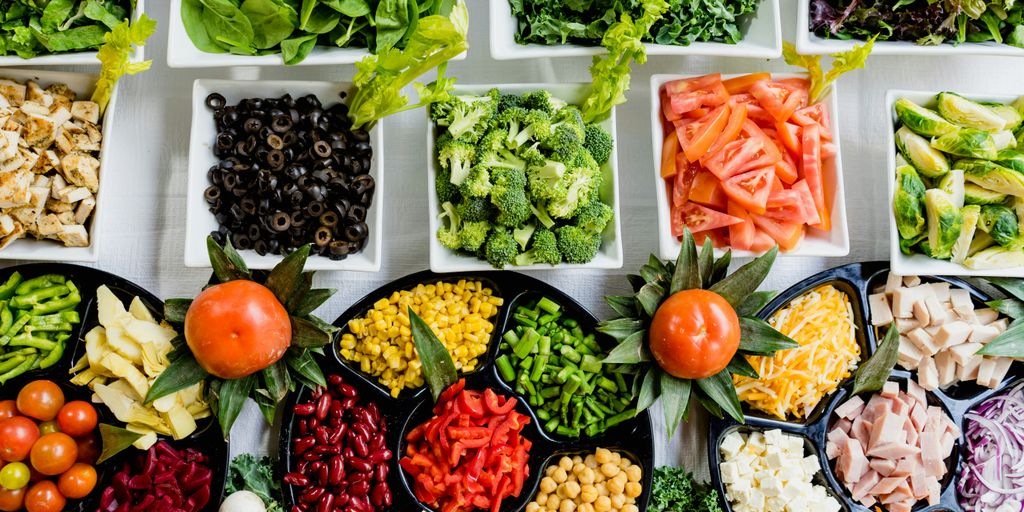
Nutrition plays a key role in leading a vibrant and healthy life. This guide aims to simplify the connection between what we eat and our overall well-being. By understanding the importance of nutrition, we can make better choices that enhance our health and energy levels. Let’s explore the essential aspects of nutrition that contribute to a lively and fulfilling life.
Key Takeaways
- Eating a mix of macronutrients—proteins, carbs, and fats—is essential for good health.
- Vitamins and minerals, though small, are crucial for our body’s functions.
- Staying hydrated helps with digestion and keeps our energy up.
- Superfoods, which are packed with nutrients, can boost our diets significantly.
- Mindful eating helps us enjoy our food and recognize when we’re full.
Understanding the Connection Between Nutrition and Health
The Role of Macronutrients
Nutrition is essential for a vibrant life, and it starts with understanding the relationship between nutrition and health. Eating the right balance of macronutrients—proteins, carbohydrates, and fats—fuels our bodies and supports overall well-being. Here’s a quick breakdown:
- Proteins help repair muscles and build tissues.
- Carbohydrates provide energy for daily activities.
- Fats support cell function and hormone production.
Micronutrients and Their Importance
While macronutrients are crucial, we must not overlook the importance of micronutrients. Vitamins and minerals, though needed in smaller amounts, play significant roles in:
- Supporting immune function.
- Maintaining bone health.
- Promoting healthy skin and vision.
The Impact of Nutrition on Mental Health
Nutrition also affects our mental health. A well-balanced diet can improve mood and cognitive function. Research shows that certain foods can help reduce the risk of depression and anxiety. Eating a variety of nutrient-rich foods can lead to better mental clarity and emotional stability.
In summary, understanding how food choices impact your physical and mental well-being is vital for a healthy life. By making informed decisions about what we eat, we can enhance our overall health and happiness.
Building a Balanced Diet for Optimal Well-Being
Incorporating a Variety of Foods
A balanced diet is not just about eating healthy foods; it’s also about variety and portion control. Including a mix of colorful fruits, vegetables, lean proteins, and whole grains on your plate ensures you get a wide range of nutrients that are essential for your health. Here are some tips to help you:
- Prioritize plant-based foods: Make sure that vegetables, fruits, beans, and nuts are the main part of your meals.
- Cook at home: Preparing meals at home can help you explore different foods and flavors.
- Shop for groceries regularly: Keeping your kitchen stocked with healthy ingredients makes it easier to prepare nutritious meals.
The Importance of Portion Control
Understanding portion sizes is crucial for maintaining a balanced diet. Eating the right amounts helps you avoid overeating and ensures you get the nutrients you need. Remember, it’s okay if your diet isn’t perfect all the time. Focus on progress rather than perfection.
Creating a Nutrient-Dense Plate
To create a nutrient-dense plate, aim to fill it with:
- Fruits and vegetables: Aim for a variety of colors to maximize nutrients.
- Lean proteins: Include sources like chicken, fish, beans, and nuts.
- Whole grains: Choose options like brown rice, quinoa, and whole-grain pasta.
- Healthy fats: Incorporate foods like avocados, olive oil, and nuts.
Eating well is a journey, not a destination. By making small changes and being mindful of your choices, you can build a balanced diet that supports your overall well-being.
In summary, building a balanced diet involves incorporating a variety of foods, understanding portion control, and creating a nutrient-dense plate. By following these guidelines, you can improve your health and enjoy a vibrant life!
Hydration: The Key to Sustaining Health
Staying hydrated is essential for overall health and well-being. Water is crucial for many bodily functions, including digestion, temperature regulation, and nutrient transport. Here are some key points about hydration:
The Benefits of Staying Hydrated
- Staying hydrated helps you stay sharp, focused, and in a better mood throughout the day.
- It promotes healthy skin, making you look and feel better.
- Proper hydration can improve physical performance, especially during exercise.
How Much Water Do You Really Need?
- The general recommendation is to drink at least 8 cups (64 ounces) of water a day, but individual needs can vary.
- Factors like age, activity level, and climate can affect how much water you should drink.
- A good rule of thumb is to drink water when you’re thirsty and to keep sipping throughout the day to prevent dehydration.
Hydration and Physical Performance
- Staying hydrated is vital for athletes and anyone who exercises regularly. It helps maintain energy levels and reduces the risk of injury.
- Drinking water before, during, and after workouts can enhance performance and recovery.
Remember, hydration is not just about drinking water; it also includes consuming foods with high water content, like fruits and vegetables. Keeping your body well-hydrated is a simple yet powerful way to support your health and vitality!
The Power of Superfoods in Your Diet
Superfoods are special foods that are packed with nutrients and can greatly improve your health. Adding these nutrient-rich foods to your meals can lead to numerous health benefits. Here are some key points about superfoods:
Identifying Nutrient-Rich Superfoods
- Berries: These are high in antioxidants, which help protect your body from damage.
- Leafy Greens: Spinach and kale are great for vitamins and minerals.
- Nuts and Seeds: These provide healthy fats and protein.
- Fish: Fatty fish like salmon are rich in omega-3 fatty acids, which are good for your heart.
Incorporating Superfoods into Meals
To make the most of superfoods, try these simple ideas:
- Add berries to your breakfast cereal or yogurt.
- Toss leafy greens into your salads or smoothies.
- Snack on nuts instead of chips.
- Include fish in your dinner at least twice a week.
The Science Behind Superfoods
Research shows that superfoods can help reduce inflammation and lower the risk of heart disease. For example, antioxidant-rich superfoods like berries can strengthen your ability to fight infection and disease. By including these foods in your diet, you can support your overall health and well-being.
Embracing superfoods is a delicious way to enhance your diet and promote a healthier lifestyle. Start small by adding one superfood to your meals each week and notice the positive changes in your health!
Mindful Eating: Enhancing Your Relationship with Food

Practicing Mindfulness During Meals
Mindful eating is all about being present while you eat. It encourages you to notice your thoughts, feelings, and physical sensations related to food, without judgment. This practice can help you improve your relationship with food and tackle issues like overeating and yo-yo dieting. Here are some tips to get started:
- Eliminate distractions during meals, such as phones or TV.
- Focus on the flavors and textures of your food.
- Take your time and chew slowly.
The Benefits of Eating Slowly
Eating slowly has many benefits. It allows your body to recognize when it’s full, which can help prevent overeating. When you eat at a slower pace, you can enjoy your food more and appreciate each bite. This can lead to:
- Better digestion
- Improved nutrient absorption
- A more satisfying meal experience
Listening to Your Body’s Hunger Signals
Understanding your body’s hunger signals is key to mindful eating. Instead of eating out of habit or boredom, try to tune in to your body’s needs. Here’s how:
- Check in with yourself before eating. Are you truly hungry?
- Pay attention to how different foods make you feel.
- Stop eating when you feel satisfied, not stuffed.
Mindful eating is a journey, not a destination. It takes time to develop a healthy relationship with food, but the effort is worth it for your overall well-being.
Tailoring Nutrition to Fit Your Lifestyle
Understanding Individual Nutritional Needs
Every person is unique, and what works for one may not work for another. It’s important to recognize your own nutritional needs based on factors like age, activity level, and health goals. Here are some steps to help you assess your needs:
- Evaluate your current diet: Keep a food diary for a week to track what you eat and drink.
- Identify your goals: Are you looking to lose weight, gain muscle, or maintain your health?
- Consult a professional: A nutritionist can help you create a personalized plan that fits your lifestyle.
Adapting Diets for Specific Goals
Tailoring your diet to meet specific goals is essential. For instance, if you’re aiming for weight loss, focus on portion control and nutrient-dense foods. Here are some tips:
- Prioritize whole foods: Fill your plate with fruits, vegetables, and lean proteins.
- Limit processed foods: These often contain added sugars and unhealthy fats.
- Stay consistent: Make gradual changes to your eating habits for lasting results.
The Role of Cultural Foods in Nutrition
Incorporating cultural foods into your diet can enhance your meals and connect you to your heritage. Embrace the variety by:
- Exploring local cuisines: Try new recipes that reflect your culture.
- Using seasonal ingredients: This not only supports local farmers but also adds freshness to your meals.
- Balancing flavors: Combine traditional dishes with healthy ingredients to create a nutritious meal.
Remember, nutrition is not a one-size-fits-all approach. By understanding your unique needs and preferences, you can create a diet that supports your health and lifestyle. Embrace the journey of discovering what works best for you!
The Interplay Between Exercise and Nutrition
Fueling Your Workouts with Proper Nutrition
To get the most out of your workouts, eating the right foods is essential. Here are some key points to consider:
- Carbohydrates provide energy for your workouts.
- Proteins help repair and build muscles after exercise.
- Fats are important for long-lasting energy, especially during longer workouts.
Post-Exercise Recovery Foods
After exercising, your body needs to recover. Here are some great options:
- Bananas for quick energy replenishment.
- Greek yogurt for protein and probiotics.
- Whole grain toast with nut butter for a balanced meal.
The Synergy of Diet and Physical Activity
Nutrition and exercise work together to keep you healthy. When you eat well, you:
- Improve your energy levels.
- Enhance your performance.
- Support your overall health.
Remember, the food you eat acts as fuel for your body, influencing your energy levels and mood.
In conclusion, understanding the connection between nutrition and exercise is vital for achieving your health goals. By focusing on a balanced diet, you can maximize your workouts and maintain a vibrant life. This relationship is crucial, especially when considering how changes in food and exercise might help prevent and treat cardiovascular diseases. It’s all about finding the right balance!
Conclusion
In conclusion, our journey through nutrition shows just how much our food choices affect our health. Eating well is not just about following strict rules; it’s about making smart choices that help us feel good and live better. By focusing on nutritious foods and understanding what our bodies need, we can enjoy a lively and fulfilling life. So, let’s celebrate good food, take care of our health, and thrive in every part of our lives!
Frequently Asked Questions
What are some easy ways to add superfoods to my meals?
You can start by mixing berries into your yogurt or adding spinach to your smoothies. Small changes can really boost your nutrition.
When is the best time to drink water?
It’s good to sip water throughout the day. Drinking a glass before meals can help with digestion, and staying hydrated during exercise is very important.
How can I keep a balanced diet when things get tough?
Planning ahead and bringing healthy snacks can help. Choose the best options when eating out and remember that balance takes time.
Can I change my diet if I have specific health goals?
Yes! You can adjust your diet for weight loss, muscle gain, or other health goals with help from a nutrition expert.
What foods are good for my gut health?
Foods like yogurt, kefir, and fermented items like sauerkraut can help keep your gut healthy.
How can I tell fact from fiction in nutrition advice?
Stay informed by looking for trustworthy information and talking to nutrition experts to help clear up any confusion.






